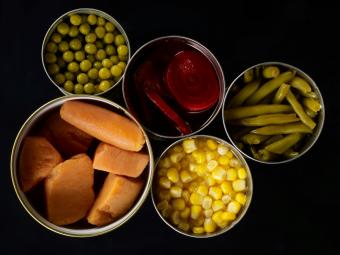
Just because food comes in a can doesn't mean you should forgo food safety precautions as even canned foods can make you sick sometimes. It's important to understand canned food safety so you can keep your family healthy.
Are All Canned Foods Shelf Stable?
Most canned foods are shelf stable and can be stored for long periods in room temperature (no refrigeration required), which is one benefit of using canned foods over fresh foods. In addition to canned foods, other non-perishable (shelf stable) items include jerky, bottled foods, pasta, rice, spices, oils, sugar, and flour. Certain canned foods (some canned hams and seafood, for example) aren't shelf stable and need to be refrigerated, but these foods will be labeled "keep refrigerated."
Canning food helps prevent microorganisms from growing (preserving shelf life) in a number of ways. The food is heat processed at very high temperatures (240 to 250 degrees Fahrenheit) to destroy microorganisms, and vacuum-sealed to prevent new microorganisms from entering the cans. However, once you open a can or break the seal, you must refrigerate the food and use it within several days.
Safe Can Storage
Unless a canned food label says it's perishable and must be refrigerated, canned foods can generally be stored for long periods. If a can has a "use by" date, be sure to use it before the date it expires or throw it out. You can keep canned foods after "sell by" dates, however. General guidelines for how long you can safely store canned foods (provided by the U.S. Department of Agriculture, or USDA) include:
- Shelf-stable canned ham: 2 to 5 years
- Low-acid canned foods (poultry, meats, soups, stews, pasta products, corn, potatoes, peas, and other canned veggies with the exception of tomato products): 2 to 5 years
- High-acid canned foods: tomatoes, juices, fruits, pickles, sauerkraut, and foods with vinegar-based sauces: 12 to 18 months
- Home canned foods: 12 months
Home Canning Food Safety
Be extremely careful when canning your own foods, as bacteria (Clostridium botulinum) that cause botulism can lurk in improperly home canned foods. Botulism is a rare form of food poisoning that can cause paralysis and even death, so it's important to know the risks and take proper precautions. Bacteria must be destroyed during canning, as you can't tell by looking at, smelling, or tasting canned food the botulism toxin is present.
High-acid foods can be canned in boiling water, but low-acid foods must be processed in pressure canners to reach temperatures of at least 240 degrees Fahrenheit. To learn about the specifics, the USDA provides a complete guide to home canning.
Refrigerating Open Cans
According to the USDA, you can store unused canned food (still in the can) in the refrigerator, but it's not ideal. To preserve the best flavor and quality of food (and prevent materials from the can from leaching into food), remove the foods from the can and place them in plastic or glass containers before refrigerating these leftover items. Meats and low-acid foods will keep for three to four days, and high-acid canned foods will keep in the fridge for five to seven days.
When to Throw Cans Out
If a canned food looks suspicious in any way, it's time to throw it out. Throw away cans of food that aren't safe to eat, such as:
- Rusted cans
- Cans or jars with bulging or loose lids
- Cans that are bulging in any way
- Foods with foul odors
- Cans that are badly dented
- Jars or cans that are leaking
Foods in cans that have small dents (but otherwise look okay) are generally safe to eat. However, the USDA says if a dent is large enough to lay a finger into, throw that canned food out.
What About Frozen Cans?
Store canned foods in room temperature rather than freezing them. If canned foods are accidentally frozen (left in a car in freezing temperatures, for example), these cans can swell. Cans of food contaminated with botulism can also swell, so always toss out canned foods that are bulging in any way. The USDA says frozen cans (that haven't previously been thawed and aren't bulging) can be defrosted in the refrigerator and the food content used (after being boiled for 10 to 20 minutes), but only if the food looks and smells normal.
Choosing Canned Foods
Choosing canned foods (or canning your own) is an excellent way to extend their shelf-life, which may eliminate food waste and allow you to grocery shop less frequently. Likewise, many canned foods can be part of a soft food diet. However, use caution when canning your own foods to prevent botulism poisoning, and toss out cans that are severely damaged, rusting, bulging, or have large dents. Because many canned foods are higher in sodium than fresh foods, be sure your daily sodium intake doesn't exceed sodium guidelines to keep disease risks low.







